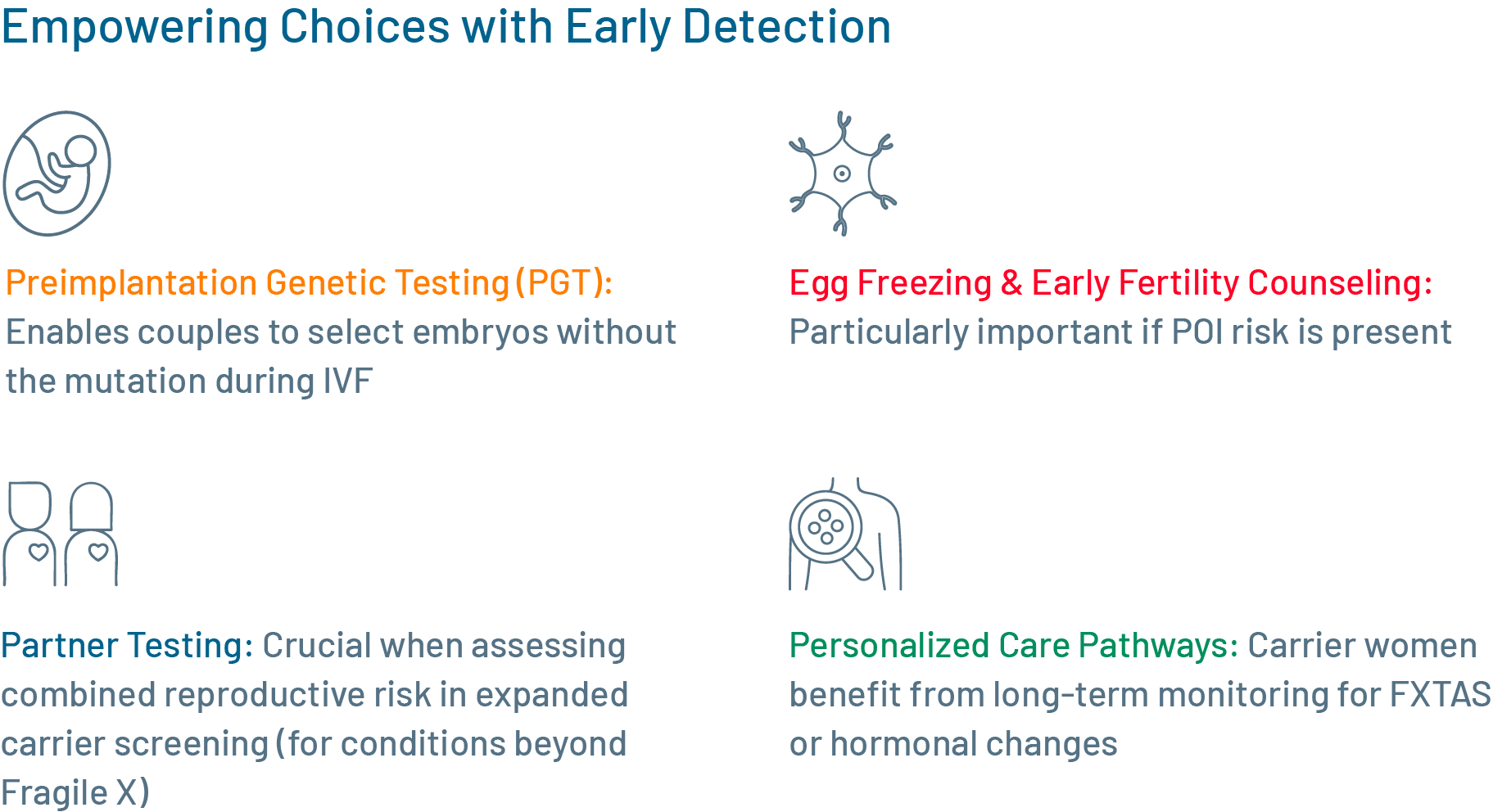
Fragile X syndrome (FXS) is the most common inherited cause of intellectual disability and autism, and it frequently flies under the radar during routine preconception evaluations, often because its most important clues are invisible.
This Fragile X Awareness Month, let’s reframe how we approach reproductive risk by recognizing the silent risks carried by seemingly healthy women planning pregnancy.
The Hidden Burden of Fragile X
FXS is caused by an expansion of CGG repeats in the FMR1 gene. Women with 55–200 CGG repeats, referred to as “premutation carriers,” may not exhibit symptoms but face a 50% chance of passing on the gene expansion to their children. If the expansion crosses 200 repeats, the child may be born with full Fragile X syndrome, leading to:

But the risk doesn’t stop there.
Carriers themselves are vulnerable to serious reproductive and neurological consequences, including:
- Primary ovarian insufficiency (POI): Premutation carriers can experience premature menopause, fertility challenges, or hormonal symptoms.
- Fragile X-associated tremor/ataxia syndrome (FXTAS): A neurodegenerative condition that can present later in life.
Unlike many inherited conditions, Fragile X represents a dual risk: silent transmission to children and a silent threat to the woman herself.
Why Does It Matter in Preconception Care?
The prevalence of premutation carriers is surprisingly high, about 1 in 150 women, yet most have no family history to raise concern. Over 80% of carriers are identified without any known family history of autism or intellectual disability, underscoring the limitations of family-history-based screening.
Despite this, Fragile X screening is rarely included in standard preconception panels unless a history is already known. Here’s the opportunity: Fragile X can be identified early, leading to better treatment outcomes and family planning. The American College of Medical Genetics and Genomics (ACMG) recommends offering Fragile X carrier screening to all women considering pregnancy, regardless of family history. The American College of Obstetricians and Gynecologists (ACOG) also supports expanded carrier screening as an optional but valuable approach in reproductive care.
What Makes Fragile X Inheritance Unique?
Fragile X follows an X-linked dominant inheritance pattern but with added complexity. The number of CGG repeats can increase across generations, especially when passed maternally. The absence of stabilizing AGG interruptions increases the risk of this expansion, which means even a “premutation” can evolve into a full mutation in a single generation.
This dynamic nature demands vigilance, even in the absence of symptoms.
Empowering Choices with Early Detection
Identifying Fragile X carriers before conception opens a range of reproductive and health-planning options:

At Strand Life Sciences, a comprehensive Carrier Screening panel can detect Fragile X and other clinically relevant conditions and is designed to integrate seamlessly with our PGT services and genetic counseling, providing end-to-end support from detection to informed reproductive planning.
What Can You Do as a Clinician?
- Proactively offer carrier screening as part of preconception visits or fertility workups
- Patients often require guidance to understand what a “premutation” means and whether it affects their own health. Refer to a genetic counselor when results show a premutation or full mutation
With accessible, affordable testing now available, there is no justification for missing silent carriers, especially when early detection can protect both a woman’s health and her child’s neurodevelopmental health.
Fragile X carrier testing is more than a genetic checkbox; it’s a tool for reproductive empowerment.
References
- Better Health Channel. (n.d.). Fragile X syndrome. https://www.betterhealth.vic.gov.au/health/conditionsandtreatments/fragile-x-syndrome
- Centers for Disease Control and Prevention. (n.d.). How Fragile X syndrome is inherited. https://www.cdc.gov/fragile-x-syndrome/about/how-fragile-x-syndrome-is-inherited.html
- Cohen, Y., Nattiv, N., Avrham, S., Fouks, Y., Friedman, M. R., Hasson, J., Kalma, Y., Azem, F., Malcov, M., & Almog, B. (2021). A decision tree model for predicting live birth in FMR1 premutation carriers undergoing preimplantation genetic testing for monogenic/single gene defects. Reproductive Biomedicine Online, 43(4), 680–686. https://doi.org/10.1016/j.rbmo.2021.06.009
- European Society for Human Reproduction and Embryology (ESHRE) Guideline Group on POI, Webber, L., Davies, M., Anderson, R., Bartlett, J., Braat, D., Cartwright, B., Cifkova, R., de Muinck Keizer-Schrama, S., Hogervorst, E., Janse, F., Liao, L., Vlaisavljevic, V., Zillikens, C., & Vermeulen, N. (2016). ESHRE Guideline: Management of women with premature ovarian insufficiency. Human Reproduction, 31(5), 926–937. https://doi.org/10.1093/humrep/dew027
- Gutiérrez, J. F., Bajaj, K., & Klugman, S. D. (2013). Prenatal screening for fragile X: Carriers, controversies, and counseling. Reviews in Obstetrics & Gynecology, 6(1), e1–e7.
- Hong, J., Kapoor, A., DaWalt, L. S., Maltman, N., Kim, B., Berry-Kravis, E. M., Almeida, D., Coe, C., & Mailick, M. (2021). Stress and genetics influence hair cortisol in FMR1 premutation carrier mothers of children with fragile X syndrome. Psychoneuroendocrinology, 129, 105266. https://doi.org/10.1016/j.psyneuen.2021.105266
- Leehey, M. A., & Hagerman, P. J. (2012). Fragile X-associated tremor/ataxia syndrome. In Handbook of Clinical Neurology (Vol. 103, pp. 373–386). https://doi.org/10.1016/B978-0-444-51892-7.00023-1
- Nolin, S. L., Glicksman, A., Ersalesi, N., Dobkin, C., Brown, W. T., Cao, R., Blatt, E., Sah, S., Latham, G. J., & Hadd, A. G. (2015). Fragile X full mutation expansions are inhibited by one or more AGG interruptions in premutation carriers. Genetics in Medicine, 17(5), 358–364. https://doi.org/10.1038/gim.2014.106
- Protic, D. D., Aishworiya, R., Salcedo-Arellano, M. J., Tang, S. J., Milisavljevic, J., Mitrovic, F., Hagerman, R. J., & Budimirovic, D. B. (2022). Fragile X syndrome: From molecular aspect to clinical treatment. International Journal of Molecular Sciences, 23(4), 1935. https://doi.org/10.3390/ijms23041935
- Sherman, S., Pletcher, B. A., & Driscoll, D. A. (2005). Fragile X syndrome: Diagnostic and carrier testing. Genetics in Medicine, 7(8), 584–587. https://doi.org/10.1097/01.gim.0000182468.22666.dd
